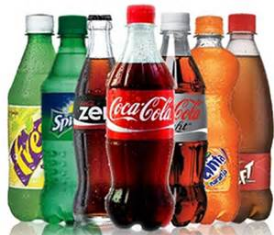Pretty much the entire population knows that drinking too much soda is bad for you. But at what point will soda begin to have a negative impact on your health? I was surprised to learn that simply drinking 1 or 2 sodas a day can negatively impact your health. While some debate the benefits of diet soda over regular, studies show that neither is worth the health risk.
1. Soda can cause a decline in kidney function. In an 11-year-long Harvard Medical School study, including 3,318 women, researchers found that diet cola is linked with a two-fold increased risk for kidney decline.
2. Soda increases diabetes risk. High levels of sugar in soda places a lot of stress on your pancreas, potentially leaving it unable to keep up with the body’s need for insulin. Drinking one or two sugary drinks per day increases your risk for type 2 diabetes by 25%.
3. Soda cans are lined with BPA. Soda cans are coated with the endocrine disruptor bisphenol A (BPA), which has been linked to everything from heart disease to obesity to reproductive problems.
4. Soda dehydrates you. Caffeine is a diuretic. Diuretics promote the production of urine, causing you to urinate more frequently. When the body’s cells are dehydrated they have difficulty absorbing nutrients, and it also makes it more difficult for the body to eliminate waste.
5. Caramel coloring in soda is linked to cancer. The artificial brown coloring in colas is a chemical process, it is not made from caramelized sugar. It is made by reacting sugars with ammonia and sulfites under high pressure and temperatures. These chemical reactions result in the formation of 2-methylimidazole (2-MI) and 4 methylimidazole (4-MI), which in government-conducted studies caused lung, liver, or thyroid cancer or leukemia in laboratory mice and rats.
6. Caramel coloring in soda is linked to vascular issues. Dr. Nehal N. Mehta, director of Inflammatory Risk Cardiology at the University of Pennsylvania states that there is a link between vascular problems and caramel-containing products.
7. Soda is high in calories. A 20 ounce can of Coca Cola contains 17 teaspoons of sugar and 240 calories…empty calories devoid of any nutritional value. It would take the average adult over one hour of walking to burn off the 240 calories in a 20-ounce soda.
8. Caffeine in soda blocks the absorption of magnesium. According to Carolyn Dean, M.D., N.D. Magnesium is essential for more than 325 enzyme reactions in the body. Magnesium also plays a role in your body’s detoxification processes and therefore is important for minimizing damage from environmental chemicals, heavy metals, and other toxins.
9. Soda increases obesity risk in children. Each additional soda or other sugary drinks consumed per day increases the likelihood of a child becoming obese by about 60%. Sugary drinks are connected to other health problems as well.
10. Soda increases heart disease in men. Each soda consumed per day increases the risk of heart disease by 20% in men.
11. Acid in soda wears away dental enamel. Lab testing on soda acidity shows that the amount of acid in soda is enough to wear away dental enamel. pH levels in soda can be as low as 2.5, as a frame of reference battery acid has a pH of 1, water has a pH of 7.0.
12. Soda contains high amounts of sugar. The average 20-ounce can of Coca Cola has the equivalent of 17 teaspoons of sugar, it’s not hard to see that soda can be bad for your teeth and your overall health.
13. Soda contains artificial sweeteners. While many people opt for artificial sugar to lower caloric intake the tradeoff for your health isn’t so sweet. Artificial sugars are linked to numerous illness and diseases including cancer.
14. Soda depletes your mineral levels. Sodas that contain phosphoric acid removes much needed calcium from your bones. After studying several thousand men and woman, researchers at Tufts University, found that women who drank 3 or more cola based sodas a day, had almost 4% lower bone mineral density in their hips, even though researchers controlled their calcium and vitamin D intake.
15. Drinking soda changes your metabolism. Dr. Hans-Peter Kubis, the director of the Health Exercise and Rehabilitation group at Bangor University in England, has found that drinking soda on a regular basis can actually change the metabolism in the human body. Participants drank 140 grams of sugar every day for four weeks (that’s less than two 20 ounce cans of Coke). The results: their metabolism changed after the four weeks, making it more difficult for them to burn fat and lose weight.
16. Drinking more than one soda daily, increases your risk for heart disease and metabolic syndrome. According to Ravi Dhingra, M.D., lead author of the study and an instructor in medicine at Harvard Medical School. “If you are drinking one or more soft drinks a day, you may be increasing your risk of developing metabolic risk factors for heart disease.” The Framingham study included nearly 9,000 individuals, over a four year period. Researchers found that individuals consuming one or more sodas a day had a 48 percent increased risk of metabolic syndrome compared to those consuming less than one soft drink daily.
17. Diet soda does not help you lose weight. A University of Texas Health Science Center study found that the more diet sodas a person drank, the greater their risk of becoming overweight. Consuming two or more cans a day increased waistlines by 500% greater than those who do not consume diet soda.
18. Diet sodas contain mold inhibitors. They go by the names sodium benzoate or potassium benzoate, and they’re used in nearly all diet sodas. “These chemicals have the ability to cause severe damage to DNA in the mitochondria to the point that they totally inactivate it – they knock it out altogether,” Peter Piper, a professor of molecular biology and biotechnology at the University of Sheffield in the U.K., told a British newspaper. The preservative has also been linked to hives, asthma, and other allergic conditions, according to the Center for Science in the Public Interest.
Some companies have phased out sodium benzoate. Diet Coke and Diet Pepsi have replaced it with another preservative, potassium benzoate. Both sodium and potassium benzoate were classified by the Food Commission in the UK as mild irritants to the skin, eyes, and mucous membranes.
19. Sodas containing ascorbic acid and potassium benzoate can form benzene, a known carcinogen. Benzene can form in beverages and foods that contain both ascorbic acid and potassium benzoate. According to the FDA, when benzoate is exposed to light and heat in the presence of vitamin C, it can be converted into benzene. According to the American Cancer Society, benzene is considered a carcinogen
20. Daily sodas and other sugar sweetened drinks are linked to Non-Alcoholic Fatty Liver Disease (NAFLD). The 2,634 individuals in the study completed a CT scan to measure the amount of fat in the liver. They saw a higher prevalence of NAFLD among people who reported drinking more than one sugar-sweetened drink per day compared to people who said they drank no sugar-sweetened beverages.
21. Some sodas contain flame retardant. Brominated vegetable oil (BVO) is added to many citrus based sodas and sports drinks to prevent the drinks from separating. What’s the concern? BVO is patented by chemical companies as a flame retardant. It is also banned in over 100 countries, but it is still used in the U.S. Learn more here.
References
1. http://www.ncbi.nlm.nih.gov/pubmed/20884773
2. http://www.ncbi.nlm.nih.gov/pubmed/20693348
4. http://answers.webmd.com/answers/1166858/is-caffeine-a-diuretic
5. http://www.cspinet.org/new/201102161.html
7. http://www.coca-colaproductfacts.com/en/coca-cola-products/coca-cola/
8. Staying Healthy with Nutrition: The Complete Guide to Diet and Nutritional Medicine”; Elson Haas, M.D.; 2006 .Pg. 170
9. http://www.ncbi.nlm.nih.gov/pubmed/11229668
10. http://www.ncbi.nlm.nih.gov/pubmed/22412070/
11. http://now.tufts.edu/articles/what-lies-beneath
12. http://www.coca-colaproductfacts.com/en/coca-cola-products/coca-cola/
13. http://www.ncbi.nlm.nih.gov/pubmed/?term=artificial+sweeteners
14. http://www.webmd.com/osteoporosis/features/soda-osteoporosis
15. http://www.ncbi.nlm.nih.gov/pubmed/22733000
16. http://www.bu.edu/news/2007/07/24/soft-drinks-increase-risk-for-heart-disease-factorand/
17. http://uthscsa.edu/hscnews/singleformat2.asp?newID=3861
19. http://www.fda.gov/food/foodborneillnesscontaminants/chemicalcontaminants/ucm055131.htm
20. http://www.ncbi.nlm.nih.gov/pubmed/26055949
21. http://www.pepsicobeveragefacts.com/Home/Product?formula=44316*01*01-07&form=RTD&size=20








